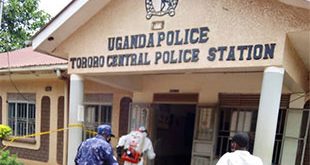
Napak, Uganda | THE INDEPENDENT | A team from the Ministry of Agriculture has blamed the repeated flooding in Karamoja to poor land management.
John Lodungokol, the Assistant Commissioner crop production in the Ministry of Agriculture told URN on Sunday that the environmental degradation in Karamoja was the main cause of flooding that always hits the region.
Last week, a total of 800 families were displaced by floods in Nasinyonoit village, Kangole town council in Napak district.
The families who are still pondering the next move are currently sheltered at the nearby primary school while others live with relatives whose homes were not affected.
According to Lodungokol, soil in Karamoja has no strength to absorb water because the trees that could help the soil to be firm have been destroyed for charcoal burning, an activity that has turned out to be highly commercial in the region.
“Whenever it rains, Karamoja becomes flooded and all that water runs off at a high speed and settles in Teso region, leaving the region dry very fast when the rains stops.
In 2018, International Union for Conservation of Nature (ICUN) released a survey report showing that thousands of the people in Karamoja sub region in north eastern Uganda are at risk of losing their livelihoods due to fast degradation of rangeland in the region.
The report shows that every year, Karamoja region loses thousands of tonnes of fertile soil to the speeding running water to the areas of Teso region.
The report highlighted that the areas which would have been good for food production in the region have also been gazetted and that 77.2% of the land area in Karamoja is gazzetted under government control with 11.6% under national forest reserves, 24.8% under exclusive mineral exploration license and 40.8% under wildlife and the land available to over 1.1million people in Karamoja is approximately 38% of the total land in Karamoja.
Lodungokol added that the situation can be saved if the region embraces tree planting and stops cutting down of trees for charcoal burning.
But Ms Lucy Nakut, one of the residents in Iriiri sub county have a different option saying the only source of living for most people in Karamoja is through charcoal burning.
Nakut suggested that government needs to design projects that can help most families in Karamoja to sustain a living.
“A reason as to why most families in Karamoja cut down trees is because they don’t have any other alternative for surviving, how I wish government could design projects that can make people shift away from tree cutting,” she said.
Patrick Lokol, another resident said although government claims a lot of money is being pumped in Karamoja through various projects, these projects were not designed to address the needs of the people of Karamoja.
“Some of these projects were being designed at H otel Africana in Kampala without consulting us the local community who are to benefit from these projects because if they were to consult us the community members, we would be in position to tell them what we need,” he said.
Mario Tengei, the retired district production officer of Nakapiripirit said that in the next ten years from now, Karamoja will be a desert.
He said the rate at which environmental degradation is taking place is dangerous.
“It’s worse when it is a rainy season like now because water washes away soil in the region and creates deep gullies,” he said.
*****
URN
 The Independent Uganda: You get the Truth we Pay the Price
The Independent Uganda: You get the Truth we Pay the Price



